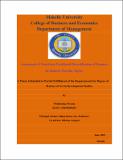| dc.contributor.author | Weldebrhan, Werede Tesfay | |
| dc.date.accessioned | 2014-09-29T14:28:06Z | |
| dc.date.available | 2014-09-29T14:28:06Z | |
| dc.date.issued | 2013-06 | |
| dc.identifier.citation | Weldebrhan Werede Tesfay (2013) Assessment of Non-farm Livelihood Diversification of Farmers in Enderta Woreda, Tigray, Thesis. Mekelle:MU. | en_GB |
| dc.identifier.uri | https://opendocs.ids.ac.uk/opendocs/handle/20.500.12413/4549 | |
| dc.description.abstract | Although agriculture is the mainstay of the population in Ethiopia, introducing rural non-farm livelihood diversification is also important for improving the coping mechanisms of the farmers and providing additional income sources. In addition the non-farm activities are direct income sources for the landless people in the rural areas. This study aims to identify the types and reasons behind the selection of non-farm activities, investigate the constraints and opportunities of non-farm activities and finally come up with the institutional support needed to improve the development of non-farm activities in rural areas. The primary data is collected using a semi - structured questionnaire from 156 samples, selected with systematic random sampling method. And from FGD held at three levels. Data is analyzed using SPSS and described by descriptive statistics, cross-tabulation and charts. The study findings indicate that the participation of the farmers in non-farm income generating activities is informal, temporary and traditional. Besides the service sector – particularly petty trade, which account for 44 percent, is reported as the dominant non-farm activity in the woreda. The major constraints identified are lack of awareness, lack of credit access, lack of skill training and absence of marketing information. Availability of natural resources and interests of the farmers to participate in the non-farm activities are the existing major opportunities prioritized. With regard to the institutional support the respondents agreed on multi-institutional support provision to the rural non-farm participant in order to solve the constraints mentioned. The study also recommends the need for the prevalence of responsible institutions to improve rural people’s access to non-farm livelihoods should be one of the priority issues in rural poverty reduction intervention or rural policy. | en_GB |
| dc.language.iso | en | en_GB |
| dc.publisher | Mekelle University | en_GB |
| dc.rights.uri | http://creativecommons.org/licenses/by-nc-nd/3.0/ | en_GB |
| dc.subject | Rural Development | en_GB |
| dc.title | Assessment of Non-farm Livelihood Diversification of Farmers in Enderta Woreda, Tigray | en_GB |
| dc.type | Thesis | en_GB |
| dc.rights.holder | Mekelle University | en_GB |


